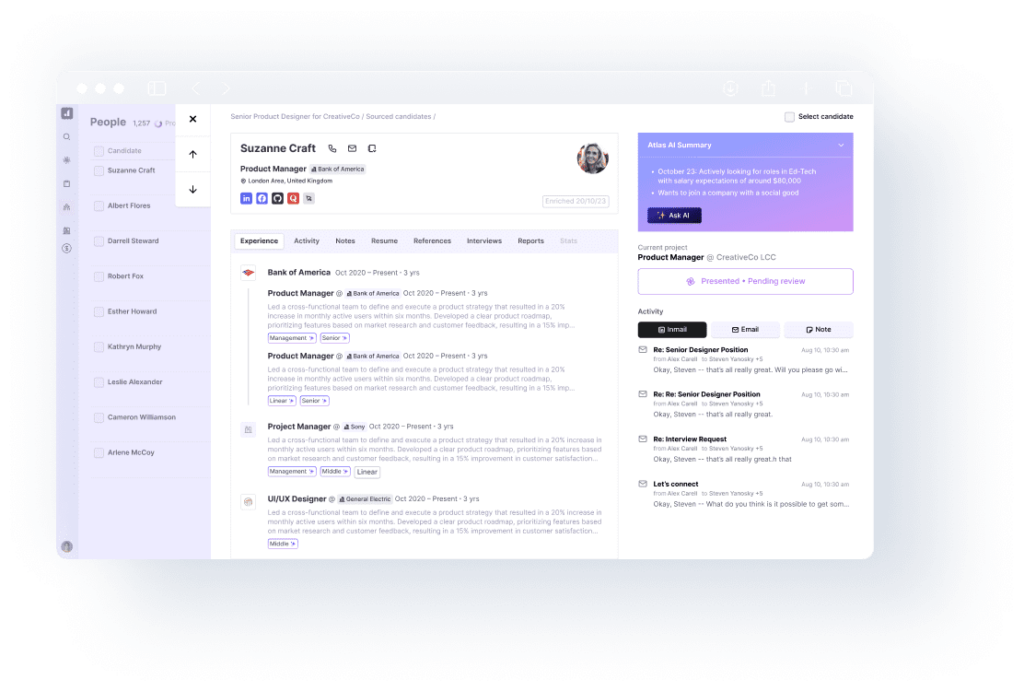
// Recruitment Strategies, Executive Search Best Practices
Executive Search and Recruitment - 18 Hard Truths You Should Know
31/10/2024
7 MIN
If you’ve been in executive search and recruitment for long enough, you’ll know it’s a rewarding but often a ruthless world. Behind the polished pitches, the glamorous success stories, and the seamless placements lie some gritty realities that agency recruiters, particularly in executive search, must contend with.
Here, we’ll delve into a few hard truths about executive search in the hope that awareness can drive resilience and ultimately, success.
1. The “Ideal Candidate” Is Often a Unicorn
Clients frequently arrive with an exhaustive list of criteria, seeking executive talent that embodies a rare combination of experience, industry expertise, and leadership skills.
However, these “unicorn” candidates are exceedingly rare and often content in their current positions, making them difficult to attract.
Convincing clients to recalibrate their expectations towards more realistic profiles or transferable skills can be challenging. The ability of executive search consultants to guide and influence client perspectives is important in these situations.
Pro-Tip – Shift the focus from a “perfect candidate” to aligning client expectations with the realities of the talent market, emphasising core competencies over exhaustive checklists.
2. Top-Tier Executives Don’t Just Wait Around for the Perfect Role
Senior executives are often inundated with opportunities and do not actively browse job boards. For an executive search firm, sourcing candidates means cultivating relationships with passive candidates long before roles become available.
Many recruitment leaders realise that success lies in proactively building and nurturing talent pools, regardless of immediate job openings.
Pro-Tip – Foster relationships with top candidates continuously, ensuring you have a curated list of potential hires ready when opportunities arise.
3. Market Timing Can Make or Break a Search
Economic fluctuations, industry shifts, and geopolitical events can dramatically impact hiring trends. Changes in funding, industry demand, or regulations can prolong searches or halt them altogether.
It’s a harsh reality, but success in executive search often hinges as much on market timing as on your industry expertise.
Pro-Tip – Stay attuned to market trends and maintain open communication with clients about timing and expectations, adopting a consultative approach when conditions shift.
4. It’s a Marathon, Not a Sprint
Executive searches, especially for high-stakes roles, often take longer than clients expect. Maintaining momentum without depleting resources or overwhelming candidates is vital.
For executive search recruiters, balancing efficiency with thoroughness is essential for keeping all parties engaged throughout prolonged search cycles.
Pro-Tip – Establish realistic timelines upfront, preparing clients and candidates for a marathon, not a sprint, and conduct regular check-ins to maintain engagement.
5. Client Expectations Can Be Sky-High – and Non-negotiable
As an executive recruiter, you’ll encounter clients with lofty expectations regarding quality, speed, and candidate calibre.
However, clients may be less flexible on critical factors such as salary, timelines, or benefits. Negotiating with clients to adjust compensation or consider a broader range of candidates is often necessary yet can be complex.
Pro-Tip – Initiate early discussions around compensation and flexibility to set a realistic tone for the search, positioning yourself as a trusted advisor backed by data-driven insights.
6. The Industry Is Rife with Competition – and Innovation
Competition in the executive search space is fierce, whether from established firms or innovative newcomers employing AI-driven sourcing methods. As new recruitment platforms emerge, traditional methods may struggle to keep pace. If you don’t adapt, you might find it challenging to keep pace with the competition.
Pro-Tip – Stay competitive by embracing technology and committing to continuous learning. Invest in tools that streamline workflows, enhance candidate experience, and distinguish your agency’s brand.
Here’s a useful guide with an evaluation template to help you assess potential vendors effectively and select the right recruitment agency software.
7. Turnover Among Placed Executives Is Uncomfortably High
Successfully placing a candidate is just the beginning, if they don’t remain with the organisation long-term, it reflects poorly on your agency.
Executive turnover is often influenced by workplace culture, leadership dynamics, and expectations. Many leadership teams feel they are battling against the odds to secure long lasting placements. Fostering an understanding of retention strategies is essential for both the agency and the client.
Executive turnover is often influenced by workplace culture, leadership dynamics, and expectations.
Many executive recruiters feel they are battling against the odds to secure long lasting placements. Fostering an understanding of retention strategies is essential for both the agency and the client.
Pro-Tip – Go beyond the basics during the search by evaluating candidates for cultural fit and leadership compatibility. Conduct post-placement check-ins to support their transition and improve retention rates.
8. Your Expertise Isn’t Always Valued at Its True Worth
While executive search is highly specialised, clients may not fully appreciate the depth of work involved – from sourcing candidates to negotiation and placement. They may view fees as a mere transaction rather than an investment in expertise, which can be disheartening when months of hard work go into each placement.
Pro-Tip – Highlight the value of your work by showcasing successful placements and the processes behind them. Educate clients on the complexities of executive search to enhance their appreciation for your efforts.
It’s also essential that executive level candidates recognize your value.
As Adriane Willig points out, many candidates mistakenly view recruiters as obstacles, believing they only need to bypass them to present themselves directly to hiring organisations.
Be sure to clarify that, as a retained recruitment agency, you are deeply invested in pitching candidates effectively to your clients, serving as a vital link in the hiring process.
9. Executive Talent Shortages Are Real
The demand for executive talent often surpasses the available supply, particularly in niche industries. This shortage can make sourcing suitable candidates a labour-intensive and time-consuming process, requiring creative strategies to engage potential hires.
Pro-Tip – Expand your sourcing methods to include passive candidates, leveraging your extensive network and industry connections to uncover hidden talent.
10. Recruitment Is Not a Quick Fix
Many clients expect immediate results, but executive recruitment is inherently a lengthy process. Building relationships with clients and candidates, understanding their needs, and thoroughly vetting candidates takes time, necessitating clear communication to manage expectations effectively.
Pro-Tip – Set realistic timelines with clients from the outset, and provide regular updates to keep them informed and engaged throughout the process.
11. Cultural Fit Is Subjective
Assessing candidates for cultural fit can often lead to subjective biases, which might cause organisations to overlook highly qualified individuals who don’t conform to a narrow definition of culture. Striking a balance between cultural alignment and skill sets is critical.
Pro-Tip – Use structured interview processes and diverse hiring panels to minimise biases and ensure a more holistic evaluation of candidates.
Explore these ten powerful interview questions and strategies designed to help you assess a candidate’s decision-making under pressure, approach to risk, and ability to handle complex situations.
12. Client Relationships Can Be Transactional
Some clients may see recruitment as a transactional process rather than a collaborative partnership, which can hinder long term relationship building. It’s essential to nurture these relationships to create a sustainable business model.
Pro-Tip – Regularly check in with clients beyond active searches to reinforce the partnership and offer insights, showing your ongoing commitment to their success.
13. Market Dynamics Change Quickly
The executive job market is influenced by numerous factors, including economic conditions and industry trends, requiring executive search firms to stay agile and informed to adapt their strategies effectively.
Pro-Tip – Invest in market intelligence tools and resources to keep abreast of trends and provide clients with timely, data-driven insights during the search process.
14. Not All Candidates Are Honest
While many candidates present themselves as ideal fits, some may exaggerate their qualifications or experiences. As an executive recruiter, it’s vital to verify backgrounds thoroughly to avoid placing unsuitable candidates.
Pro-Tip – Incorporate thorough reference checks and background verification processes into your recruitment practices to ensure candidate integrity.
15. Success Metrics Can Be Misleading
Focusing solely on placement rates may obscure the broader picture of your agency’s effectiveness. A comprehensive view of success should include candidate satisfaction, client retention, and long-term placement outcomes.
Pro-Tip – Regularly analyse and report on a range of success metrics to provide clients with a fuller understanding of the value you deliver and areas for improvement.
16. You’re Competing with Internal HR Teams
Many organisations are enhancing their internal recruitment capabilities, making it essential for executive search firms to clearly articulate their unique value proposition and how they complement internal efforts.
Pro-Tip – Emphasise the specialised expertise and extensive networks that your agency offers, positioning your services as an essential resource rather than direct competition.
17. Burnout Is Common
The high-pressure environment of recruitment can lead to burnout among agency staff, impacting productivity and retention. It’s crucial to foster a supportive work culture to retain talent within your agency.
Pro-Tip – Implement wellness programs and encourage a healthy work-life balance to help prevent burnout and maintain team morale.
18. Adopting AI in executive search is imperative
AI-powered recruitment tools now assist in everything from sourcing passive candidates and analysing resumes to automating communications and providing insights into candidate engagement.
While some firms may resist due to fears of depersonalization or implementation costs, those who adapt find they can streamline processes and uncover data-driven insights that give them a competitive edge.
Embrace AI as a supportive tool that enhances your team’s capabilities without replacing the personal, consultative elements that define successful executive search.
Pro-Tip – Explore and implement AI recruiting tools that can automate repetitive tasks, allowing your team to focus on building relationships and engaging with clients and candidates.
Face the truths to stay competitive in executive search
Running an executive search agency is no small feat. The challenges can be daunting, and the truths often uncomfortable, but facing these realities equips you with the resilience to thrive. By building a transparent, adaptive, and client-focused agency, you’ll be better prepared to tackle these challenges head-on and emerge stronger.
Want your agency to be ahead of the curve?
Implement recruitment technology to simplify workflows, enhance efficiency, and improve both candidate and client experiences.
This could be the key to closing more deals!
Explore Atlas now









